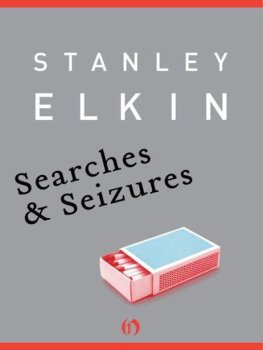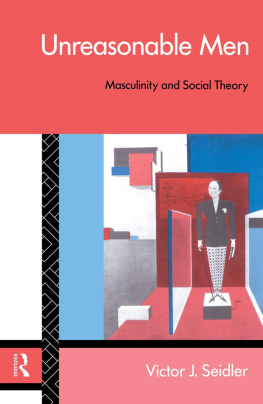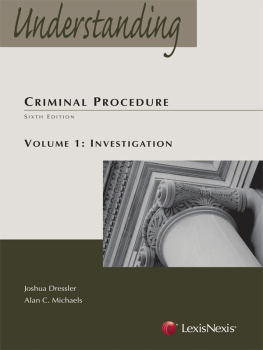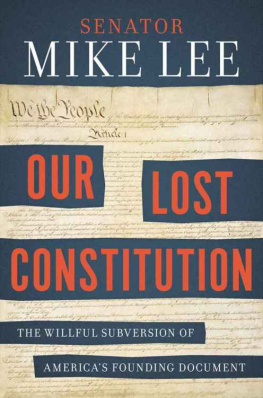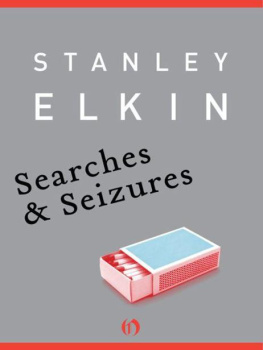Published in 2012 by The Rosen Publishing Group, Inc.
Copyright 2012 by The Rosen Publishing Group, Inc.
All rights reserved. No part of this book may be reproduced in any form without permission in writing from the publisher, except by a reviewer.
Brian Carson, Catherine Ramen.1st ed.
p. cm.(Personal freedom and civic duty)
Includes bibliographical references and index.
1. Privacy, right ofUnited StatesJuvenile literature.
2. Searches and seizuresUnited StatesJuvenile literature.
3. United States. Constitution. 4th AmendmentJuvenile literature. I. Ramen, Catherine. II. Title.
CPSIA Compliance Information: Batch #S11YA: For further information, contact Rosen Publishing, New York, New York, at 1-800-237-9932.
INTRODUCTION
I n April 2010, police officers from the Greene County Sheriffs Department descended upon I Central High School in Springfield, Missouri. They were there for one of five annual lockdowns of the school. During these lockdowns, students were confined to classrooms or the library while police officers, with the help of drug-sniffing dogs, searched the contents of lockers, including backpacks, for illegal drugs. The sheriffs department considered these lockdowns standard drills.
Yet two of the students whose bags and lockers were searchedand in which nothing illegal was foundwere the children of a Springfield city councilman, Doug Burlison. He and his wife, Mellony, were outraged by what they considered an unwarranted search of their childrens personal possessions and an invasion of their privacy. They soon announced their intention to sue Springfields school system, its superintendent, Central Highs principal, and the Greene County sheriff. The Burlisons claimed that the rights of all students at Central High were violated by these lockdowns, particularly their Fourth Amendment rights, which protect American citizens against unreasonable search and seizure.
Above: Police remove evidence from the Toms River, New Jersey, home of a police officer suspected of having killed five of his neighbors and wounding his own police chief.
The first ten amendments to the U.S. Constitution, known collectively as the Bill of Rights, center upon individual and states rights. The text of the Fourth Amendment reads:
The right of the people to be secure in their persons, houses, papers, and effects, against unreasonable searches and seizures, shall not be violated, and no Warrants shall issue, but upon probable cause, supported by Oath or affirmation, and particularly describing the place to be searched, and the persons or things to be seized.
In the case of the Central High lockdowns, there was no probable cause (the officers werent acting upon a specific tip that a particular student or group of students possessed drugs that were stashed in the school) and the sheriffs department presented no search warrant detailing precisely whom they wished to search and exactly what they were searching for. Instead, as part of a regular program of sweeps, the police engaged in a broad and indiscriminate examination of all students private possessions, without a warrant, a specific target or sought-for item, or any immediately compelling reason to engage in the search.
According to Jason Umbarger, the attorney who filed the case on behalf of the Burlisons, Warrentless mass searches of high school students send a horrific message, teach a horrific message, to the high school students of our community that theyre powerless against the state, against the police (as quoted by Doug Magditch, reporting for KSPR, the local ABC television affiliate). Students do not leave their constitutional rights at the school house gates. Yet the attorney for the Springfield public school system counters that, unlike the probable cause required when law enforcement officials wish to search an adult, school officials do not have to have probable cause for a search; they have to have reasonable suspicion, a far lower standard of justification. The Greene County sheriff, Jim Arnott, agrees, saying his department acted within the requirements of state and federal law.
Ultimately, this case will be decidedperhaps years from nowby a state and/or federal court and may even reach the Supreme Court, the ultimate arbiter of constitutional issues and the rights of citizens versus the powers of the government.
The U.S. Constitution is one of the worlds most remarkable and inspiring documents. In simple, clear language, it manages not only to safeguard the liberty of the people of the United States, but at the time of its drafting and ratification in 1787-1788, it also created a bold new plan to fundamentally change the relationship between the government and the citizens of the nation. Yet, as remarkable as the original text of the Constitution is, the first ten amendments to itthe Bill of Rightsare in some ways even more impressive and absolutely vital to Americans ability to live freely in a democratic society.
Not all of the men who debated and drafted the Constitution initially believed that a Bill of Rights guaranteeing states rights and the particular rights reserved for individualswas necessary or even desirable to include. Yet almost immediately after the Constitution was ratified, these men reconvened and began debating and drafting the first ten amendments to the United States new governing document. Their labors produced one of the greatest protections of human freedom ever created. Taken together, the Bill of Rights has had more influence on the lives of ordinary citizens than almost any other amendments to the Constitution that followed it. A citizen enjoys rights guaranteed by it every time she watches television, goes to church, or attends a school board meeting.
Of particular concern to the authors of the Bill of Rights was the nations criminal justice system. Their experience under the British during the preRevolutionary colonial era made it clear to them that in order to combat oppression and tyranny of the state, the criminal justice system must be as fair and as free from improper government interference as possible. An accused person must be given every possible guarantee of a fair trial. He or she must also be free from the fear of a government prosecuting him or her for political reasons. Also, the government must be restrained as much as possible, preventing it from violating the rights of an individual, because the law insists an individual is innocent until proven guilty.
The Fourth, Fifth, Sixth, and Eighth amendments to the U.S. Constitution all deal with what are known as the rights of the accused. All offer not only specific protections for people accused of a crime but also impose restrictions on the kinds of actions that the government can take when it accuses someone of a crime. Among these amendments, the Fourth Amendment contains some of the most important and profound limitations on the powers of the government. Created in response to some of the worst abuses of justice that the British committed against the American colonists, the protections of the Fourth Amendment have long been considered a bedrock of American justice. However, it should be pointed out that, like all the protections of the Bill of Rights, it was not until the twentieth century that it finally came to protect all citizens of the United States equally, no matter what region of the country they lived in or what their race or gender.


